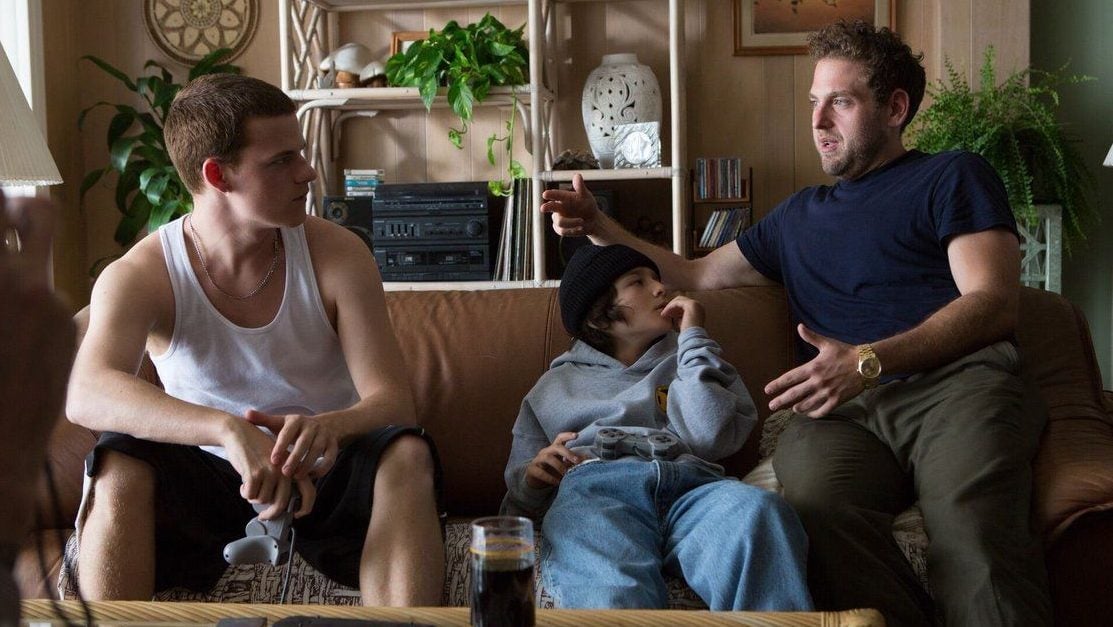“Mid90s” shows that Jonah Hill has a bright future as a director
The actor who became famous as the Superbad character with a pathological need to draw penises has now made his first film as a director—and it’s quite good.


The actor who became famous as the Superbad character with a pathological need to draw penises has now made his first film as a director—and it’s quite good.
Jonah Hill’s directorial debut, Mid90s, comes out in theaters today (Oct. 19). The film portrays the exploits of Stevie, a young teenager who joins up with a skateboarding crew in 1990s Los Angeles. The Mid90s cast is comprised entirely of real-life skaters with little to no prior acting experience (other than Katherine Waterston, who plays Stevie’s single mom, Lucas Hedges, as Stevie’s lonely, physically abusive older brother, and Jerrod Carmichael, who has a hilarious but very brief cameo as a security guard).
Sunny Suljic, who imbues the quiet Stevie with a genuine sense of withering innocence, is especially well cast. Na-kel Smith, Olan Prenatt, and Ryder McLaughlin are just as spot-on, as Ray, “Fuckshit,” and “Fourth Grade,” respectively. Each gives a raw, guileless performance—perceptive without seeming coached, empathetic without being corny.
Without this believable group of kids, Mid90s would have fallen apart. It’s a testament to Hill’s ability as a writer and director that it didn’t, that he was able to elicit such strong performances. At 34, Hill may now be the elder statesman, but he started his own acting career as a young man not much older than Suljic, playing goofy teenagers.
Some reviewers have argued Hill’s stylistic choices in the film are a little too contrived and on-the-nose, and there are indeed some kinks to work out. But it’s clear that the actor has the stuff required to launch a successful career as a filmmaker. In an interview with Variety, Hill likened his acting career thus far to a “15-year film school” that served as preparation for a lifelong dream of being a writer-director. Like every budding filmmaker, Hill has said he looks up to directors like Martin Scorsese and the Coen brothers. Of course, not everyone gets to learn the tricks of the trade from Scorsese, with whom Hill made The Wolf of Wall Street and had a four-hour meeting before getting started on Mid90s.
Hill certainly has his advantages (as a white man, Hill is getting an opportunity to jump from acting to directing that women and non-white actors of similar experience and talent level may not). But all signs are pointing to Hill using those advantages to at least begin a thoughtful second act if he chooses to continue working behind the camera.
Some are calling Hill’s film “Lady Bird for boys,” which it decidedly is not—the two movies don’t actually share a whole lot in common outside of being rough coming-of-age stories about young white people in California, in an actor’s directorial debut (okay, that’s kind of a lot in common). One thread that Mid90s does pick up on from Greta Gerwig’s film, however, is the lost art of human connection in a time right before cell phones, the internet, and social media started to replace face-to-face interaction.
When the kids are not skating, they’re talking—perhaps too much and too offensively (the film is filled with homophobic epithets, a sad but accurate reality of the culture and time period), but talking nonetheless. To each other. On couches, in abandoned playgrounds, at parties, on the side of the road. It’s in these seemingly banal conversations that we, denizens of 2018, can learn something from Hill’s band of misfit skaters.